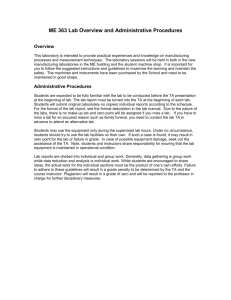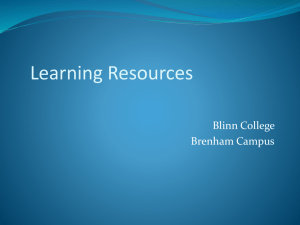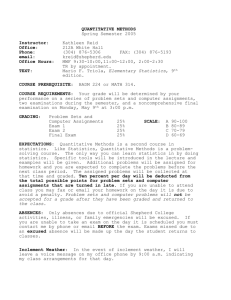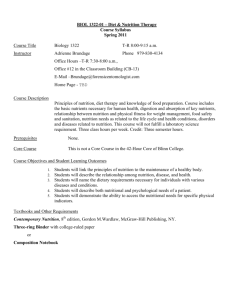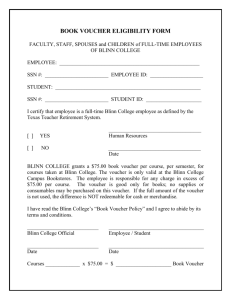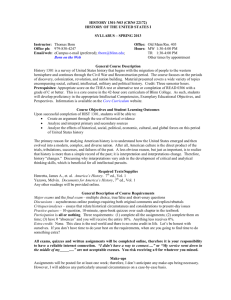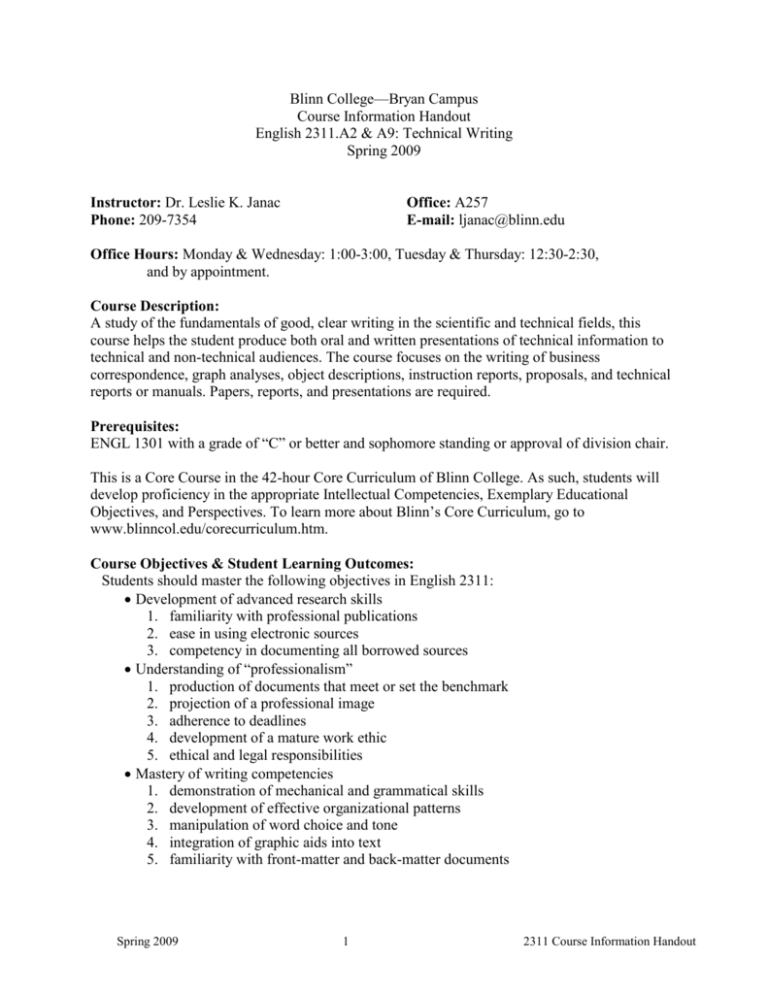
Blinn College—Bryan Campus
Course Information Handout
English 2311.A2 & A9: Technical Writing
Spring 2009
Instructor: Dr. Leslie K. Janac
Phone: 209-7354
Office: A257
E-mail: ljanac@blinn.edu
Office Hours: Monday & Wednesday: 1:00-3:00, Tuesday & Thursday: 12:30-2:30,
and by appointment.
Course Description:
A study of the fundamentals of good, clear writing in the scientific and technical fields, this
course helps the student produce both oral and written presentations of technical information to
technical and non-technical audiences. The course focuses on the writing of business
correspondence, graph analyses, object descriptions, instruction reports, proposals, and technical
reports or manuals. Papers, reports, and presentations are required.
Prerequisites:
ENGL 1301 with a grade of “C” or better and sophomore standing or approval of division chair.
This is a Core Course in the 42-hour Core Curriculum of Blinn College. As such, students will
develop proficiency in the appropriate Intellectual Competencies, Exemplary Educational
Objectives, and Perspectives. To learn more about Blinn’s Core Curriculum, go to
www.blinncol.edu/corecurriculum.htm.
Course Objectives & Student Learning Outcomes:
Students should master the following objectives in English 2311:
Development of advanced research skills
1. familiarity with professional publications
2. ease in using electronic sources
3. competency in documenting all borrowed sources
Understanding of “professionalism”
1. production of documents that meet or set the benchmark
2. projection of a professional image
3. adherence to deadlines
4. development of a mature work ethic
5. ethical and legal responsibilities
Mastery of writing competencies
1. demonstration of mechanical and grammatical skills
2. development of effective organizational patterns
3. manipulation of word choice and tone
4. integration of graphic aids into text
5. familiarity with front-matter and back-matter documents
Spring 2009
1
2311 Course Information Handout
Required Texts:
Markel, Mike. Technical Communication. 8th ed. Boston: Bedford/St. Martin’s, 2007.
Markel, Mike. TechComm Web. <http://www.bedfordstmartins.com/techcomm>, 2007.
Suggested Texts:
Fowler, H. Ramsay, Jane E. Aaron, and Janice Okoomian. The Little, Brown Handbook. 10th
edition. Custom version. New York: Pearson Longman, 2007. (English 1301 textbook)
Standard collegiate dictionary (not abridged)
Style manual or sheet showing the documentation system for your discipline (I recommend The
Chicago Manual of Style or APA.)
Tentative Daily Schedule:
Attached at the end of the Course Information Sheet
Course Requirements:
20 page Formal Report–Due on April 17 by 3:00 pm. Absolutely no late reports will be
accepted!
Oral reports over Formal Report Topic – 15 to 20 minutes
Audience analysis
Progress report
Case problems
Format exercise
Proposal
Letter of Application & Resume
Instructions/Device descriptions
In class work/quizzes
In order to pass this course, you must submit a Formal Report that demonstrates a sincere
effort to address the assignment.
These requirements are subject to some change or deletion. In addition to these formal
requirements, in-class writing assignments and quizzes may also be given.
Grade Breakdown:
Formal report & auxiliary assignments
Proposal
Progress report
Bound formal report
Oral report
15%
5%
20%
5%
Additional major grades
Audience assignment
Resume
Instructions
10%
10%
5%
Minor grades/Class participation
Final exam (50% post test + 50% case study)
20%
10%
Spring 2009
2
2311 Course Information Handout
Grading Scale:
Grades are figured on the following scale:
50–59 = F; 60–69 = D; 70–79 = C; 80–89 = B; 90–100 = A
Grading criteria:
A means "exceptional." Work completely fulfills the stated purpose and is concise, shows
mastery of the subject matter and audience adaptation, and is thoroughly researched and
scrupulously documented. Having practically no mechanical errors to distract the reader, it is free
of jargon, clichés, and other empty language. Diction is marked by a high degree of precision and
a varied, advanced vocabulary. Is free of all major and virtually all minor errors in grammar,
mechanics, organization, development, format, and documentation. Follows instructions.
B means "good." Goes beyond the minimum required for the assignment, contains few major
errors, and follows instructions. Shows knowledge of the subject matter and audience. Is free of
virtually all major and almost all minor errors in grammar, mechanics, organization,
development, format, and documentation. The minimum quality likely to be accepted by an
employer.
C means "nominally adequate." It fulfills the minimum requirements of the assignment but
goes no further than what is necessary to complete the task. Shows little attention to detail and/or
demonstrates little initiative. Acceptable college-level work. Contains many minor errors in
grammar, mechanics, organization, development, format, and documentation but fulfills the
assignment.
D means "below average." Contains several major errors or numerous minor errors.
Inadequately develops or researches topic or demonstrates poor understanding of the assignment.
Is poorly adapted to audience and fails to follow some of the directions. Format shows little
consideration of the audience's needs and fails to follow standard document formats and page
design.
F means "completely unacceptable." Contains numerous major and/or minor errors. Is written
in non-standard English. Fails to follow instructions. Inadequately credits borrowed sources or
relies excessively on a single source. Contains any form of dishonesty. Format shows no
consideration of the audience's needs and/or fails to follow standard document formats and page
design.
Blinn College Policies:
Disability Accommodations: Students with documented disabilities may seek support from
Blinn College’s Office of Disability Services (209-7251). Students are encouraged to contact this
office as early as possible to initiate services. The student must then discuss requested
accommodations with the instructor, and agreement must be reached between student and
instructor. Submit accommodation letters to instructors as early in the semester as possible.
Accommodations are not retroactive.
Attendance policy: The College District believes that class attendance is essential for student
success; therefore, students are required to promptly and regularly attend all their classes. Each
class meeting builds the foundation for subsequent class meetings. Without full participation and
Spring 2009
3
2311 Course Information Handout
regular class attendance, students shall find themselves at a severe disadvantage for achieving
success in college. Class participation shall constitute at least ten percent of the final course
grade. It is the responsibility of each faculty member, in consultation with the division chair, to
determine how participation is achieved in his or her class. Faculty will require students to
regularly attend class and will keep a record of attendance from the first day of class and/or the
first day the student’s name appears on the roster through final examinations.
If a student has one week’s worth of unexcused absences during the semester, he/she will be sent
an e-mail by the College requiring the student to contact his/her instructor and schedule a
conference immediately to discuss his/her attendance issues. If the student accumulates two
weeks worth of unexcused absences, he/she will be administratively withdrawn from class.
Unavoidable/unexpected situations may be excused, with appropriate documentation, at the
instructor’s discretion
Electronic Device Policy: All the functions of all personal electronic devices designed for
communication and/or entertainment (cell phones, pagers, beepers, iPods, and similar devices)
must be turned off and kept out of sight in all Blinn College classrooms and associated
laboratories. Any noncompliance with this policy will be addressed in accordance with the Blinn
College civility policy (Administrative Policy). Additionally, any communication understood by
the instructor to be in the nature of cheating will have consequences in accordance with the Blinn
College policy section regarding academic dishonesty. Students exempted from this policy
include active members of firefighting organizations, emergency medical services organizations,
commissioned police officers, on-call employees of any political subdivision of the state of
Texas, or agencies of the federal government. Exempted students are expected to set the
emergency-use devices on silent or vibrate mode only. Any student violating this policy shall be
subject to discipline, including suspension, in accordance with the Blinn College Student
Handbook.
Incomplete Policy: A grade of “I” may be given only in emergencies, such as the serious illness
of the student or a close family member. This grade is not for students who fall behind in their
work. To receive an incomplete the student must have satisfactorily completed all but one or two
of the final requirements of the course. The instructor and student must agree before this grade
can be assigned; then the student, instructor, and division chair must sign a course completion
contract. All work must be made up within 90 days of the course completion contract or zeroes
will be assigned for the incomplete work.
W/WF/WP Grades: Students who drop, or withdraw from, a course prior to the official drop
deadline receive a grade of W. If they drop after this deadline, they automatically receive a grade
of WF. If their work is passing on the day they drop, the instructor may change this WF to a WP
by submitting a grade change form to the Division Chair.
Scholastic Dishonesty: Blinn College does not tolerate cheating. Scholastic Dishonesty is “(1)
any attempt to receive a grade by passing someone else's work as your own, such as plagiarizing
or cheating on daily work, exams or papers, (2) any type of collusion on work for this class, or
(3) any attempt to use notes, cheat sheets, etc., during an exam or essay” (refer to the Blinn
College Student Handbook). A grade of zero will be given to any assignment in which cheating is
involved and a report made to the Division Chair. If there is a second offense, the student may
receive a failing grade for the course (see Blinn Student Handbook).
Spring 2009
4
2311 Course Information Handout
A student receiving an F in a course because of academic dishonesty may not withdraw from that
course.
Civility in the Classroom: Members of the Blinn College community, which includes faculty,
staff, and students, are expected to act honestly and responsibly in all aspects of campus life.
Blinn College holds all members accountable for their actions and words. Therefore, all members
should commit themselves to behave in a manner that recognizes personal respect and
demonstrates concern for the personal dignity, rights, and freedoms of every member of the
College community, including respect for College property and the physical and intellectual
property of others.
If a student is asked to leave the classroom because of uncivil behavior, the student may not
return to that class until he or she arranges a conference with the instructor: it is the student's
responsibility to arrange for this conference.
Student Email Accounts: All Blinn students are provided with a college e-mail account. It is
your responsibility to activate your account and check your messages frequently, or have the
Blinn e-mail set to an auto-forward for an e-mail account that is checked regularly. Unless you do
so, you will miss notification of your absences and warning of a campus emergency.
Visitors in the Classroom
Individuals (friends, family, or children) who are not enrolled as students are not allowed to
attend class without prior approval of the instructor.
No food or drinks are allowed in Blinn College classrooms.
Instructor Policies:
The goal of this course is to prepare you for the writing you will be doing in the professional
world. As such, I expect you to conduct yourself as a professional by reading and following the
policies listed here, being prepared for class each day, and treating your classmates and me with
respect.
Assignments
In general, when grading I assume that all papers meet the minimum requirements asked for in
the assignment and are worth an average C. It is up to you, through attention to detail in fulfilling
the assignment, documenting information taken from other sources, spell checking and
proofreading, and general skill in writing, to convince me that the paper is worth more than an
average C. Unfortunately, through a lack of attention to detail in these areas, you may also
convince me that the paper is worth less than an average C.
Papers that do not meet the assignment requirements do not receive passing grades, regardless of
the writing skill involved. Prior to each assignment, I will specify the requirements for that
assignment in writing. Any unjustified deviations from those requirements will result in an F for
the assignment.
I do not accept late work without written documentation of an excused absence and my approval
of that excuse. All written documentation must be submitted with an explanatory memo of
Spring 2009
5
2311 Course Information Handout
transmittal. I reserve the right not to accept any excuse, other than those stipulated by Blinn
College as officially excused.
I do not accept late daily work under any circumstances. Please do not ask to turn daily work in
late because you had it done but left it at home on the due date. You may not make up in-class
work you miss when absent. If you miss daily work or in-class work, you must provide proof of
an excused absence to avoid having this missed work count against you.
Major papers that are not placed in my hands by the end of my office hours on the due date are
considered late and will not be accepted. Papers may not be slid under my door after office hours,
submitted through email, or turned in to the Copy Center. The only exception to this rule is the
formal report, which may be turned in at the Copy Center.
You must submit documentation of an excused absence in a timely manner. This means you have
one week from the date of the absence to submit proof that the absence is excused. I will not
accept documentation that an absence was excused two to three weeks later. I also will not go
through all of your absences at the end of the semester and discuss which absence was actually
excused and which was not.
If your absence occurred on the day that an assignment was due and your absence is excused, you
have one week from the due date of that assignment to contact me and make arrangements to turn
the assignment in. If I do not hear from you regarding the missed assignment by the end of that
week, a zero will be assigned for that grade and you will not be able to make up the grade. You
may contact me in person, through e-mail, or by phone.
All work will be done on a computer (unless otherwise stated and approved), and neatly printed.
Light or poorly printed documents are unprofessional and the poor print job will affect your
grade. Computers and good quality printers are provided on campus in the Open Computer Lab
(H225) and the Learning Center (L258), and accounts have been set up for you through Blinn.
You have paid for this service so make sure you use it.
All work should be done in 12-point Times New Roman and printed on good quality printer
paper. Most assignments will be single-spaced within paragraphs and double-spaced between
paragraphs, with a ragged right margin (exceptions to this will be discussed in class). Do not full
justify any document! Deviations from this format will result in a 10-point deduction from
the assignment’s final grade.
A typed memo of transmittal will accompany all assignments. You will single-space this memo,
double-spacing between the paragraphs. Make sure that you do not write one-paragraph memos
of transmittal. We will discuss format requirements in more detail in class and you will be
expected to put those requirements into practice to avoid substantial grade penalties.
Format, grammar, mechanics, punctuation, and presentation will all be factors in determining an
assignment's grade. Proofread carefully and spell check! Every word processing program
(Microsoft® Word and Word Perfect®) has spell check attached to it. Use it please. If you need
help with an assignment, feel free to come by my office or to visit the Writing Center (A119) for
help. Neither the Writing Center nor I will proofread or edit papers. Failure to spell check a
document will result in at least a 10-point deduction from the assignment’s final grade.
Spring 2009
6
2311 Course Information Handout
The Blinn Writing Center offers help and feedback on written assignments all semester long. The
mission of the Writing Center is to make better writers; thus, in a comfortable environment
through one-on-one consultations with experienced, degreed writing tutors, you will be helped to
both identify writing concerns and address them. Rather than focusing only on a piece of writing
during your session, tutors will work to help you improve your writing skills overall. Students
direct each session, and tutors offer help at ANY point in the writing process—from
understanding an assignment, choosing a topic, or planning to revising, editing, documenting
sources, or understanding comments on a graded paper. To set up an appointment, simply call
them at (979) 209-7591 or stop by. Walk-ins are also welcomed although they may not receive as
prompt attention. For handouts, visit “The Writing Center” link under Blinn’s Homepage quick
links.
Once your formal report project is proposed and approved, you may not change topics without
my permission. Changing report topics after the proposal has been accepted will require that you
submit a second, shorter proposal. Once you submit your formal report, I will not return it to you.
You will also be expected to submit a copy of your formal report on disc. Make multiple copies
of this disc because I will not return it to you.
To pass this class you must submit the Formal Report. In addition, I will not accept your Formal
Report without a graded Proposal assignment showing that I have approved your topic and focus
for the semester. This means that you must also turn in the Proposal to pass the class.
You will be informed, in writing, of your grade in the course at midterm. You will know where
you stand at that time, how much work is left in the course, and what you need to do to improve
your grade, if applicable. I will keep a copy of this report for my files and give you a copy of it
for your records.
Select out-of-class papers will be submitted to TURNITIN.com PRIOR to the start of class on
the day the paper is due. These out-of-class papers are not considered turned in until they are
submitted to TURNITIN.com AND turned in at the beginning of class on the due date.
Attendance
Attendance is necessary. This is not a class where reading the book will tell you everything you
need to know to do well. Lectures are very important to performance on assignments. I will call
roll at every class meeting, and I will hold class for the entire scheduled time (by my watch).
I expect you to get to class on time. If you arrive late, you should remind me to mark you present
after class is over. This is especially important in light of the absence policy. You will not be
allowed to make up quizzes you miss by being late nor will you be given extra time to complete
in-class assignments.
If you miss class, arrange with a classmate to copy notes given in class. Learn the names, phone
numbers, and email addresses of your classmates and cultivate their friendship. I will not repeat
lectures you miss. If you miss several classes in succession, you should consider dropping this
class.
I also expect you to remain in class for the entire period. If you leave before class has been
dismissed without first obtaining my permission, you will receive an unexcused absence and a
zero on any daily work you may have turned in for that day.
Spring 2009
7
2311 Course Information Handout
Officially excused absences are limited to representing Blinn College at school-sanctioned
functions and religious/holy days. You must provide written documentation of your participation
in these functions. Illness on your part, a death in the immediate family, or jury duty (with proof
from the court) may also be considered an excused absence (I reserve the right to make the final
decision on accepting any absence other than representing Blinn College at school-sanctioned
events and religious/holy days).
Contacting me and providing proof of an excused absence is especially important in light of the
absence policy. If I do not hear from you within a few days of your absence, and you are at the
end of the allowed unexcused absences, you may be dropped from the class before you are able
to provide proof that your absence is excused. It is your responsibility to keep track of the
number of your absences.
You are responsible for informing me of excused absences and providing written proof of your
excuse (no absence is excused without written documentation). You will also submit a typed
memo of transmittal to accompany the written documentation. Car trouble, court dates, jail time,
failed alarm clocks, work, or other classes are not excused absences.
If you know you will be absent on a given day, for whatever reason, contact me prior to the
absence and discuss this with me. If you know there will be a wedding, a funeral, or a doctor’s
appointment and you contact me prior to missing class, I may be able to make arrangements for
you to turn a paper in early and discuss the activities we will be doing in class on that day.
Regardless of the circumstances, if you miss more than 20% of the semester due to absences
(whether excused or unexcused) you are not entitled to make up the course work. Student who
miss 20% or more of this course miss too much of the material/skills taught to successfully make
up missed work. Even though students may keep up on the assigned reading, there is no way to
make up missed lectures, class discussions, group work, etc., all very important and necessary
methods of learning the skills required for this course.
Other Suggestions
Technical Writing is a skills-building course. This means that you are expected to take what you
learn from one assignment and apply it to all other assignments that follow after without my
having to restate those principles. For example, once we discuss audience analysis, you should
not have to be told to apply the audience analysis principles to writing your proposal. That does
not mean that I will not go back over those principles, but I expect you to apply principles you
learn from lectures and previous assignments without my having to point them out specifically.
Because this is a skills-building course, you must pay careful attention to the lectures and
assigned readings from the book. You will be quizzed on readings and lectures throughout the
semester. To make sure that you do not miss important information, you should come to class
prepared to take notes. You will always need paper and pen/pencil. If I am lecturing or answering
questions, it is important. Do not wait until I start to lecture and then begin to get out your pen
and paper. I will not repeat myself if you miss something. Do not ask me if you need to know
something for a test.
Spring 2009
8
2311 Course Information Handout
If you miss class, it is your responsibility to approach me about whether you missed any
assignments or whether I handed back papers. Papers that are not collected on the day that I hand
them back will be kept in my office. I will not continue to bring them with me to class. I also will
not bring assignment memos with me to class past the day I make the assignment.
Because there is so much information to be covered in a relatively short amount of time, class
periods are always important and you should focus on English in your English class. Don’t use
my class to catch up on other work. If you have an assignment or a test in another class that
requires your full attention, I would rather you not come to class so you can devote the attention
to that work that it deserves. Of course, you will still be responsible for any assignments handed
out on days that you miss because of other class work and, because other classes do not constitute
excused absences, you will not be allowed to make up any daily grades you may miss.
Please ask questions if you don’t understand something, particularly on how an assignment is to
be prepared. I can’t clarify something you don’t understand if I don’t know about your question.
While I urge you to ask these questions in class so that other people can benefit from the
answers, you may also discuss them with me in my office or e-mail me with questions.
I will be bringing in student examples, but please realize that these examples are not perfect. You
must be in class for a clear discussion of the flaws and good points of these examples.
If you cannot see me during my office hours and would like a conference with me to discuss your
work, please make an appointment with me after class. Please be sure you see me write the
appointment in my appointment book. If I don’t have your name written down in my book, I
cannot guarantee that I will remember the appointment.
I urge you to use e-mail to get in touch with me about making appointments or discussing
assignments or class concerns, etc. I check my e-mail for the last time when I leave the office.
Please don’t wait until 9:00 pm to e-mail me with urgent questions that must be answered that
night so you can incorporate the information into the assignment due on the next day. The fact
that I did not respond to those questions will not serve as an excuse for you to turn the
assignment in late or for doing the assignment incorrectly.
I do not give extra credit work or bonus points. Please do not ask for this. In addition, I do not
curve grades.
Rather than coming to me at the end of the semester and telling me what grade you have to have,
decide on that at the beginning of the semester and work accordingly. Realize that I can only
grade what you give me on paper, and all grades will be based on the paper that you hand in. I do
not grade based on effort. I will not change grades based on how hard you worked or how
important it is that you get a B.
Be realistic in your grade expectations. This is a writing course and your writing ability will be a
major factor in the grade you receive. You may have heard that in Technical Writing, “only
format counts.” In reality, everything counts—organization, word choice, writing ability, format,
tone, style, and grammar. If you have not mastered basic grammar and punctuation, you will be at
a disadvantage in this course.
Spring 2009
9
2311 Course Information Handout
Microsoft® Word 2007 has a default line spacing of 1.15. This is a subtle but noticeable
difference from single spacing and will lead to a deduction for formatting errors.
I invoke the 24-hour rule. I will not discuss a grade for 24 hours after you have received the
grade. Do not ask to talk to me about a grade immediately after you get the paper back. I will not
respond to telephone or e-mail requests for grades. Discussions about grades in general or on
individual assignments should be held in the privacy of my office, so please don’t approach me
in the classroom when there are other students around and ask me about your grade.
Do not count on your ability to get an incomplete if you fall behind. Make sure that you
understand Blinn’s incomplete policy before you come to ask me for one. In addition, I do not
have the final say on an incomplete. I must get approval for the incomplete from my department
chair and I must be able to justify the true need for that incomplete.
If you intend to drop this class, you are required by Blinn College policy to do it yourself. The
last day to drop this class with no penalty is Friday, April 17, 2009. If you intend to drop (by
some means other than the absence drop), do so by that day.
If you drop after April 17, Blinn will automatically assign a WF for the class. This will affect
your GPA in the same way an F would. You must then come to me and discuss your status in the
class at the time you dropped. I can only change your grade to a WP if you were, in fact, passing
the class at that time.
Errors that send me into orbit:
Because professionalism matters so much in technical writing, you need to work on eliminating
certain errors as much as possible. I want you to be aware of some of the possible problems and
penalties you can encounter this semester.
1) Improper memo or letter format on any assignment—10 point deduction from final
assignment grade.
2) Obviously not spell checking/proofreading document—10 point deduction from final
assignment grade.
3) Writing a one-paragraph memo or letter.
4) Stapling assignments. I will bring paper clips to class with me when assignments are due.
5) Using sources in any assignment without citing the information taken from those sources
(plagiarism)—automatic zero on the assignment.
Spring 2009
10
2311 Course Information Handout
English 2311 Grade Record:
Name:
Minor grades
_____ x .20 (20%) = _____
Audience adaptation
_____ x .10 (10%) = _____
Proposal
_____ x .15 (15%) = _____
Resume
_____ x .10 (10%) = _____
Instructions
_____ x .05 (5%) = _____
Progress report
_____ x .05 (5%) = _____
Bound formal report
_____ x .20 (20%) = _____
Oral report
_____ x .05 (5%) = _____
Final exam
(50% post test + 50% case study)
_____ x .10 (10%) = _____
Spring 2009
11
Total
_____
Final Grade
_____
2311 Course Information Handout
Tentative Schedule (subject to change)
This is a tentative schedule. If changes have to be made to this schedule, they will be announced in class.
Students are responsible for knowing about such changes even if they are absent when changes are
announced.
Complete each reading assignment before the class meeting in which it is listed. Be prepared for in-class
assignments covering the reading at each meeting. Some in-class assignments are listed on the schedule.
Quizzes at <www.bedfordstmartins.com/techcomm> will be assigned in class.
I have also put together a WebCT supplement to this course. This calendar will be posted there as well.
Make sure you check that WebCT supplement at least once a week as quizzes will be posted there that
count for 5% of your semester grade.
All out of class assignments (in bold) are due at the beginning of class on the day listed, unless otherwise
notified.
Date
Topic/Activity
August 25
Monday
August 27
Wednesday
August 29
Friday
September 1
Monday
September 3
Wednesday
September 5
Friday
September 8
Monday
September 10
Wednesday
September 12
Friday
September 15
Monday
September 17
Wednesday
September 19
Friday
September 22
Monday
September 24
Wednesday
Introduction to Course
Mandatory Conferences on Formal
Report Topics
Mandatory Conferences on Formal
Report Topics
Library Assignment Due
September 26
Friday
September 29
Monday
October 1
Wednesday
October 3
Friday
October 6
Monday
Style and Tone;
Business Correspondence
Business Correspondence
Chapter 10 & 11
In-class case study and discussion
Proposals Due
Formal Reports
Chapters 17 & 18
Spring 2009
Reading/Assignment
Diagnostic Pretest
Memo of Introduction
Introduction to Technical Writing
(Detailed lecture available on WebCT)
Introduction to Formal Reports;
Audience
Audience Analysis
Chapters 1, 2, & 3
Chapter 5
Audience Analysis
Format
Chapter 12
Graphics
Chapter 13
In-Class Group Format Assignment
Proposals
Chapters 6, 8, & 16
Proposals
Audience Assignment Due
Proposals
Chapter 14
Formal Reports
12
2311 Course Information Handout
October 8
Wednesday
October 10
Friday
October 13
Monday
October 15
Wednesday
October 17
Friday
October 20
Monday
October 22
Wednesday
October 24
Friday
October 27
Monday
October 29
Wednesday
October 31
Friday
November 3
Monday
Formal Reports
November 5
Wednesday
November 7
Friday
Formal Report troubleshooting
November 10
Monday
November 12
Wednesday
November 14
Friday
Begin Oral Reports
November 17
Monday
November 19
Wednesday
November 21
Friday
November 24
Monday
December 1
Monday
December 3
Wednesday
Oral Reports
Job Application Materials and
Interviews
Job Application Materials and
Interviews
Job Application Materials and
Interviews
Group Case Studies
Chapter 15
Instructions/Device Descriptions
Chapters 9 & 19
Instructions/Device Descriptions
Grade Conferences
Resumes Due
Progress Reports
Chapter 15
Progress Reports
Formal Report Troubleshooting
Conferences
Progress Reports Due
Graphics Assignment Due
Oral Report Lecture
Chapter 21
Oral Reports
Oral Reports
Formal Reports Due by 3:00 pm,
Friday, November 14, in my office
Last Day to Drop With No Penalty.
Oral Reports
Oral Reports
Instructions Due
Oral Reports
In-class case studies if time allows
Oral Reports
Oral Reports
Final Exam Schedule (Plan to take the final at this time as no early or makeup finals will be given)
MWF 10:00-10:50 am—Friday, December 5, 10:15-12:15 am
Spring 2009
13
2311 Course Information Handout
Personal Data
All the information given on this form will go into my files and be kept confidential.
Name:
Classification:
Major:
Email address:
Telephone number: home:
work/cell:
What is the best time for me to reach you?
What are your career goals?
How much writing do you think those goals will entail?
Besides the grade, what do you want to get out of this class?
I, _________________________________, have read Dr. Janac's course policies. I understand
and agree to abide by them.
`
__________________________________ _______________________
Signature
Date
Spring 2009
14
2311 Course Information Handout


